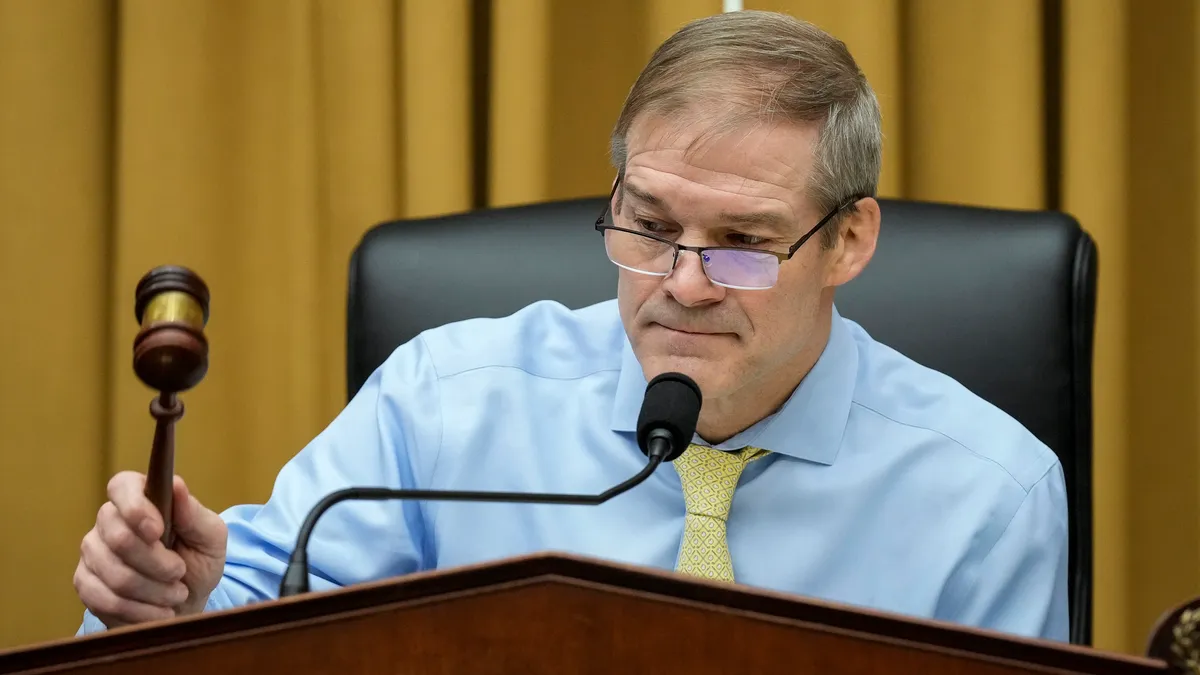Dive Brief:
- More than 70 investors have left Climate Action 100+, an investor-led coalition, in the years since Republicans on the House Judiciary Committee have investigated the group and whether such collaborative efforts on ESG and climate violate antitrust laws, according to an interim report released by the committee Friday.
- The disclosure was made in a new report on Dec. 13 that also alleged a “climate cartel” of investor coalitions colluded with European investors and pensions from Democrat-led states and pressured the “Big Three” U.S. asset managers to force changes on ExxonMobil’s board of directors in 2021.
- Climate Action 100+ saw multiple waves of departures in 2024, including some high-profile institutions. The group no longer counts JPMorgan Chase, State Street and Goldman Sachs as members after all three left the organization this year. The report said the more than 70 departures have been for reasons that include “obligations under antitrust and competition laws.”
Dive Insight:
The Dec. 13 interim report is the latest product from the Judiciary Committee’s probes from the past two years on “the adequacy of U.S. antitrust laws in light of increasing commitments among left-wing environmental activists and major institutional investors to impose environmental, social and governance (ESG) goals on the U.S. economy.” The report follows another the committee released in June that said it found evidence of a “climate cartel” of environmental groups and financial institutions that were colluding to force decarbonization.
The committee accused that same “climate cartel” of manufacturing a pressure campaign against Exxon’s board of directors with activist investor Engine No. 1 as the public face. That campaign resulted in three new Exxon board members — with helpful votes from blue state pension funds, as well as BlackRock, Vanguard and State Street also voting to remove and replace members of the board.
“While publicly the world thought the 2021 ExxonMobil board ‘refreshment’ campaign was advanced by a small activist hedge fund from San Francisco, ‘behind the scenes,’ the climate cartel knew that it was the ‘engine behind Engine [No.] 1,’” the report said, citing internal documents from climate nonprofit Ceres.
The latest interim report accuses investor climate coalitions like CA100+, Ceres, the Glasgow Financial Alliance for Net Zero and the United Nations-convened Net-Zero Asset Managers initiative of using the playbook from the Engine No. 1 campaign to more broadly push the oil and gas sector to pivot to clean energy production.
The report said that the playbook includes targeting disfavored companies, forcing climate disclosures and emissions reductions through engagements and then enforcing demands by pushing to replace directors.
In addition to the House Judiciary Committee investigation of whether groups like CA100+ and others violate antitrust laws — an assertion that members of the groups have consistently denied — Republicans in the House also conducted ESG investigations from an ESG Working Group and from the House Financial Services Committee.
While the investigations have not led to laws passed with Democrats in control of the Senate, they have put pressure on members of the groups.
At the same time, JPMorgan and State Street left CA100+ and BlackRock transferred its membership to an international arm of its business. Additionally, after the House Judiciary renewed its probe into CA100+ members — sending letters to over 130 members — subsidiaries of Franklin Templeton and Sun Life followed Goldman Sachs out of the door.
The report said the Judiciary Committee “remains committed to continuing its investigation of the climate cartel’s anticompetitive conduct to inform potential legislative reforms.”
Though any House-passed legislation without broad bipartisan support has largely been stymied under a Democrat-controlled Senate, Republicans will control both chambers of Congress and the White House come January.










